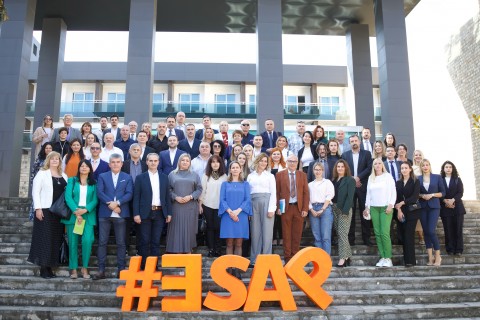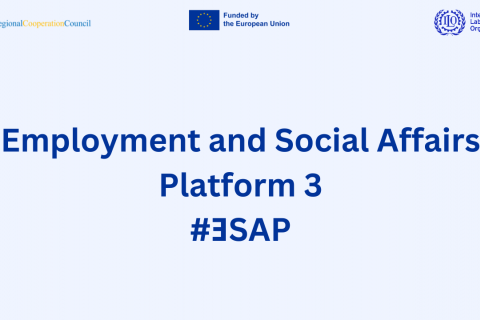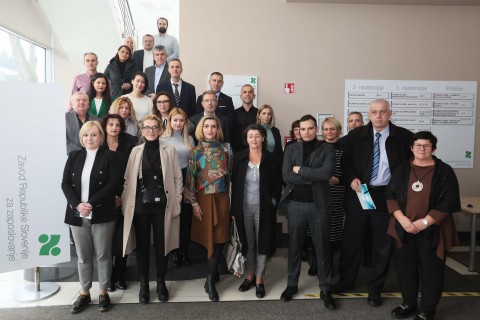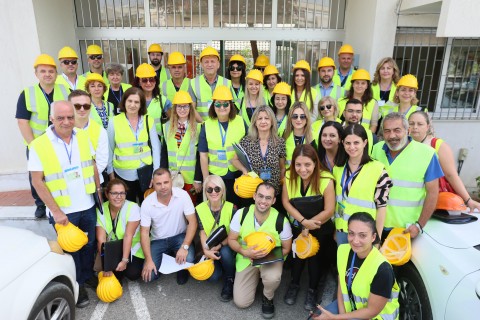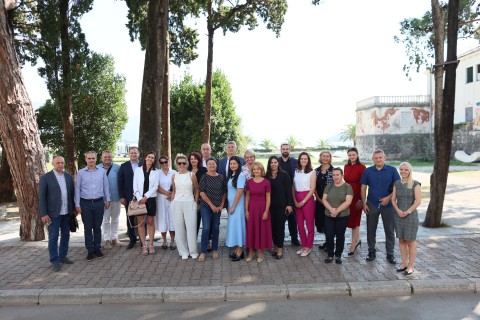- Home
- News & Stories
News & Stories Archive
RCC ESAP 3: Third phase of the Employment and Social Affairs Platform Project (ESAP) kicked off in Budva, Montenegro
ESAP 3 project brought together its partners for a two-day event, held in a hybrid format, to mark the beginning of the Phase 3 of the project
Facilitating Well-functioning Labour Markets and Social Policies in the Western Balkans
Third phase of the EU-Funded Employment and Social Affairs Platform Project Begins
RCC Secretary General on The Occasion of Labour Day: How to Mark this Holiday, with more Persons Employed in the Western Balkans and Fewer Abroad?
Sarajevo – May 1st brings workers around the Western Balkans and the world a well-deserved break from work, but also reminds us of ongoing battles for improved working conditions, brain drain, long-term unemployment and undeclared work.
Painting the Western Balkans’ Labour Markets in Brighter Colours - Op-Ed by the Secretary General of the Regional Cooperation Council Majlinda Bregu
Op-ed by Secretary General of the Regional Cooperation Council Majlinda Bregu discusses the evolving labor market trends in the Western Balkans, highlighting a decrease in unemployment rates but also pointing out significant challenges such as skill shortages, emigration of talented workers, ...
RCC ESAP 2: Western Balkan Public Employment Services Visit Employment Service of Slovenia to discuss aligning Western Balkan practices with the EU requirements
RCC ESAP 2 Organised a Two-day Thematic Study Visit to Employment Service of Slovenia to discuss Active Labour Market Policies and Measures: good practices, IT solutions, databases, statistics and reporting
RCC ESAP 2: Western Balkan Enforcement Authorities Explore Cyprus' Approach to Undeclared Work and Discuss Platform Work
RCC ESAP 2 Organised a Two-day Thematic Study Visit to Cyprus Labour Inspectorate, Focused on Tackling Undeclared Work in the Western Balkans within Its Mutual Assistance Projects
RCC ESAP 2: Strengthening Capacities of Western Balkans’ Public Employment Services for Alignment of the Labour Market Policies Databases with the EU Requirements
ESAP 2 organised regional workshop for Western Balkans’ Public Employment Services on classification and recording of Labour Market Policies and roadmaps for their alignment with the EU practices
RCC ESAP 2: Western Balkan Enforcement Authorities Address Challenges of Under-declared Work
Tirana – Under-declared work/envelope wages was a topic for discussion of the enforcement authorities from the Western Balkans at the one-day regional Workshop organised by the Regional Cooperation Council's (RCC) Employment and Social Affairs Platform project (ESAP2) in Tirana, Albania ...
RCC ESAP 2: Mutual Assistance Projects to Combat Undeclared Work in the Western Balkans Successfully Concluded
Regional Cooperation Council’s (RCC) Employment and Social Affairs Platform 2 (ESAP 2) in partnership with Albanian and North Macedonian’s Labour Inspectorates hosted the Mutual Assistance Projects (MAPs) aimed at enhancing the performance of Western Balkan enforcement authorities ...
RCC ESAP 2: Strengthening Enforcement Authorities’ Efforts in Combating Undeclared Work
ESAP 2–organised 2023 Follow-Up MAP visits reflect on progress made in tackling undeclared work in Western Balkan economies
RCC ESAP 2: Moderate progress of the Western Balkan economies regarding the European Pillar of Social Rights
RCC’s ESAP 2 project brought together its partners for a two-day event, held in a hybrid format, to deliberate on employment and social issues.
RCC ESAP 2: Final Event of 2022 PES Bench-learning Cycle
Employment and Social Affairs Platform 2 (ESAP 2) project of the Regional Cooperation Council (RCC) gathered representatives of the Western Balkans Public Employment Services (PES) for the Final Regional Event – “Mutual Learning and Best Practices” of the 2022 WB Cycle of ...
RCC ESAP 2 Supports Dialogue on Employment of Foreign Workers in Bosnia and Herzegovina
ESAP 2 project provided support for organizing the Conference “Employment of foreign workers – perspectives and opportunities”, co-organized with the Labour and Employment Agency of Bosnia and Herzegovina
RCC ESAP: 2022 Western Balkans PES Bench-learning cycle comes full circle with the Peer Visit of Western Balkans’ Public Employment Services to their colleagues in Serbia
RCC’s ESAP 2 project organized the peer visit of representatives of Public Employment Services (PESs) from Western Balkan economies to the Serbian PES
Eighth online training: Greening Apprenticeships − the role of apprenticeships in the green transition
The European Alliance for Apprenticeships (EAfA) has launched the eighth in a series of online training modules designed to provide insight into apprenticeship systems within the EU.
RCC ESAP 2: Peer Visits within the 2022 Cycle of PES Bench-learning supported by RCC ESAP 2 Start with Visit of Western Balkans’ PES Peers to Bosnia and Herzegovina
RCC’s ESAP 2 project organized the 1st peer visit of representatives of Public Employment Services (PESs) from Western Balkan economies to the PESs of Bosnia and Herzegovina as part of the 2022 PES bench-learning cycle
RCC ESAP 2: Labour Inspectors from Western Balkans, including Tax Authorities from some economies, visited Norwegian Labour Inspectorate and Social Partners, exchanging experiences and practices on tackling informal employment
RCC ESAP 2 organized a thematic Study Visit to Norway within its Mutual Assistance Projects focused on Tackling Undeclared Work in the Western Balkans
RCC ESAP 2: More Active Women in the Labour Markets, Stronger PES in the Western Balkan Economies
RCC’s ESAP 2 Project organized 2-day Regional Event (Women and Work and Stronger PES) to discuss women employment and specific actions to enhance Public Employment Services in the Western Balkans
Bregu: When women engage, take responsibilities, grow and help each other they can be a rising tide that lifts all boats
RCC launces the first Regional Women in Entrepreneurship Network in the Western Balkans
RCC ESAP 2: Youth Guarantee and Active Labour Market Measures in focus of series of seminars for Public Employment Services in Bosnia and Herzegovina
Employment and Social Affairs Platform 2 project organized a series of seminars for Public Employment Services (PES) in Bosnia and Herzegovina: PES of Federation of Bosnia and Herzegovina, PES of Republika Srpska and PES of Brcko District in Bosnia and Herzegovina
Eurostat: in December 2021 Euro area unemployment was at 7.0%, EU at 6.4%
In December 2021, the euro area seasonally-adjusted unemployment rate was 7.0%, down from 7.1% in November 2021 and from 8.2% in December 2020. The EU unemployment rate was 6.4% in December 2021, down from 6.5% in November 2021 and from 7.5% in December 2020. These figures are published by ...
Commission presents Action Plan to boost the social economy and create jobs
The European Commission has today presented an Action Plan to help the European social economy thrive, tapping into its economic and job-creation potential, as well as its contribution to a fair and inclusive recovery, and the green and digital transitions.
Pact for Skills one year on: 450 organisations pledge to reskill over 1.5 million people in Europe
The Pact for Skills was set up a year ago to bring together employers, workers, public employment services, regional authorities and others to identify what skills will be needed in different sectors of the economy to ensure we can flourish in a more green and digital society.
RCC ESAP 2: Western Balkans’ Social Scoreboard and Accompanying Reports Regarding European Pillar of Social Rights Presented by ESAP 2 Project
RCC’s ESAP 2 project gathered its partners and beneficiaries at a 2-day hybrid event to discuss employment and social affairs
New report shows employment and unemployment rates nearly back at pre-crisis levels
The newest quarterly review of Employment and Social Developments in Europe (ESDE) shows that the EU economy and labour market have started to recover from the COVID-19 pandemic with employment and unemployment at almost pre-crisis rates.
Eurostat: Living conditions statistics at regional level
Social protection and inclusion policy responses to the COVID-19 crisis
A Synthesis Report has been produced by the European Social Policy Network (ESPN)
Unemployment and inequalities: the pandemic penalises the youngest
High unemployment rates, increasingly apparent inequalities, and the digital divide. In the WB6, the crisis risks leaving young people behind and provoking a new wave of migration, but it could also offer new opportunities to revive economies Aricle by Gianluca De Feo
Eurostat: Young people in education and the labour market in 2020
In 2020, in the EU, 9 in 10 people aged 15-19 years were still in education (89.5%). The older the age group, the smaller the proportion of young people in education: 49.5% of people aged 20-24 years, 14.4% of people aged 25-29 years and 4.8% of those aged 30-34 years were in education in 2020.
Recent social policy developments in Albania, Italy, Malta, Montenegro and Spain
Six new Flash Reports prepared by the European Social Policy Network (ESPN) are now available and provide information on recent social policy developments in Albania, Italy, Malta, Montenegro and Spain.
Eurostat: Statistics on employment characteristics of households
This article, using the European Union Labour Force Survey (EU-LFS) data, gives insight into characteristics of households with regard to employment. Results are presented for the EU as a whole, for all EU Member States individually, but also for four candidate countries (Montenegro, North ...
Eurostat: Euro area unemployment at 7.7%
Eurostat, June 2021: Euro area unemployment at 7.7%, EU at 7.1%
Public Employment Services smoothing the transition to a greener economy
A new report from the European Network of Public Employment Services highlights the crucial role that PES can play in smoothing the labour market transition to a greener economy, one of the key European objectives of the coming years.
Over 1 in 6 young adults not in employment or education
Over one in six (17.6 %) of young adults aged 20 to 34 were neither in employment nor education and training (NEET) in 2020 in the European Union (EU), an increase of 1.2 percentage points over 2019.
Second EU – Western Balkans Ministerial Meeting on Employment and Social Affairs
With support from the European Union, the Western Balkans will enhance labour market integration of young people.
Employment and Social Developments in Europe review shows diverse impact of COVID-19 crisis
Today, the Commission's services have published the 2021 edition of the Employment and Social Developments in Europe (ESDE) review.
Bregu: Let the Roaming Free be the turning point for the regional cooperation - “Borderless Connectivity” benefits everyone
RCC Secretary General Bregu takes part in the Berlin Process Summit hosted by German Chancellor Merkel
Bregu: 71% of young people from Western Balkans would go live and work abroad – this is an alarm bell for us all
RCC Secretary General takes part at the high-level plenary session of the Prespa Forum Dialogue
European Skills Agenda & Youth Employment Support: one year on
Already one year has passed since the European Skills Agenda saw the light of day. Time to take stock and look ahead.
May 2021: Euro area unemployment at 7.9%; EU at 7.3%
In May 2021, the euro area seasonally-adjusted unemployment rate was 7.9%, down from 8.1% in April 2021 and up from 7.5% in May 2020. The EU unemployment rate was 7.3% in May 2021, down from 7.4% in April 2021 and up from 6.9% in May 2020.These figures are published by Eurostat, the statistical ...
Council adopts European Child Guarantee
The Employment, Social Policy, Health and Consumer Affairs Council (EPSCO) has adopted the Commission proposal on establishing a European Child Guarantee.
RCC ESAP 2: Data do matter for identifying effective measures and policies in addressing labour markets’ structural weaknesses, including informal employment in particular
RCC’s ESAP 2 Project presents Study on Labour Markets in the Western Balkans at “Data Matters” webinar
How to adapt employment services to build trust with vulnerable young jobseekers
Public Employment Services (PES) have a key role to play in implementing the reinforced Youth Guarantee (YG), but can only do this successfully by showing flexibility in their offer to reach and gain the trust of vulnerable young people – often through partnership-based approaches.
Bregu: With regional youth unemployment rate at 35.1% the need to act is clear, as youth is our most precious asset
RCC’s ESAP Project presents Study on Youth Employment in the Western Balkans
Bregu: Congratulations to all Balkathon winners who showed young people of our region are innovative and creative
6 winning ideas from the Western Balkans awarded at the final Balkathon 2.0 competition ceremony today
Be creative. Be surprising. How Public Employment Services can communicate better
The European PES Network has published a new “practice casebook” for good communication by Public Employment Services (PES). It provides all the latest ideas and experiences on how PES across Europe can communicate effectively with their clients and ensure positive visibility for ...
Long working hours increasing deaths from heart disease and stroke: WHO, ILO
Long working hours led to 745 000 deaths from stroke and ischemic heart disease in 2016, a 29 per cent increase since 2000, according to the latest estimates by the World Health Organization and the International Labour Organization published in Environment International today.
BALKATHON 2.0 IS ON: Apply till 19 May and you can win mentoring and one of six awards from the 54.000 EUR award fund
For the second time the RCC is organising an online competition for best digital solutions – Balkathon 2.0
COVID-19 and the World of Decent Work
Article on the occasion of 1 May, Labour Day by Majlinda Bregu, Secretary General of the Regional Cooperation Council (RCC)
EU: Labour market in 2020
In 2020, the labour market in the EU was heavily impacted by the COVID-19 pandemic. The employment rate for persons aged 20-64 dropped to 72.4%, down by 0.7 percentage points (pp) in comparison to 2019. The employment rate for men of that age group stood at 78.1%, down from 79.0% in 2019. ...
RCC ESAP 2: Greater engagement of social partners in tackling undeclared work in the Western Balkans is much needed, authorities and social partners agree
Webinar “Improving Social Partner Involvement in Tackling Undeclared Work” in the Western Balkans held today under RCC-implemented, EU-funded ESAP 2 project
Temporary lay-offs from work record high in 2020
The beginning of 2020 was marked by an outbreak of the worldwide pandemic COVID-19, leading almost all governments around the globe to take restrictive measures. To prevent the spread of the virus and to ensure distancing of people, many businesses were temporarily shut down and many employees ...
RCC ESAP 2: Balance between prevention and deterrence one of key elements for successful, structured approach to formalizing undeclared work
Third Plenary meeting of the Western Balkan Network Tackling Undeclared Work held online today under the RCC-implemented and EU-funded ESAP 2 project
Bregu: Men outnumber women in the region’s labour force by more than a million
RCC and UNDP launched Regional Network of Women in STEM
Euro area unemployment at 8.3%, EU at 7.5% in February 2021, Eurostat publishes
In February 2021, the euro area seasonally-adjusted unemployment rate was 8.3%, stable compared with January 2021 and up from 7.3% in February 2020. The EU unemployment rate was 7.5% in February 2021, also stable compared with January 2021 and up from 6.5% in February 2020. These figures are ...
EU Solidarity in action: Commission proposes to mobilise almost €530 million to support emergency measures against the coronavirus pandemic
Today, the European Commission is putting forward a package of almost €530 million in additional financial support under the EU Solidarity Fund (EUSF). It will contribute to the efforts deployed by 17 Member States and 3 accession countries (Austria, Belgium, Croatia, Czechia, Estonia, ...
Employment development nosedived in the 2nd quarter of 2020
Virtually all economic sectors experienced clearly positive employment development over recent years. Between 2014 and 2019 employment growth within the European Union was on average at 6%; for men at 5.7% respectively women at 6.3%.
Recovering from COVID-19: How and With Whom?
OBSERVING the Western Balkans through Employment Observatory Article by Majlinda Bregu, Secretary General of the Regional Cooperation Council (RCC)
Von der Leyen: Vaccines to Western Balkans “as soon as possible”
BRUSSELS – EU leaders called for greater solidarity with third countries on the delivery of vaccines on Thursday, January 21, and European Commission President Ursula von der Leyen said the Western Balkans will receive vaccines from the EU as soon as possible.
EIB Vice-President Pavlova and Serbian Prime Minister Brnabić agree on investment plans for Serbia
The EIB will support Serbia in addressing the negative effects of the COVID-19 pandemic and boosting its green and digital transformation in line with the new Economic and Investment Plan
EIB unlocks €340m for construction of Corridor Vc in Bosnia and Hercegovina
With new €340 million allocated to Corridor Vc, the EIB continues to support this pivotal route on Pan-European network connecting the port of Ploce in Croatia with Hungary via Bosnia and Hercegovina.
Coronavirus crisis hits young people and low-paid workers in particular, shows Employment and Social Development Quarterly Review
The European Commission has today published the December 2020 edition of the Employment and Social Developments Quarterly Review, analysing the effects of the coronavirus pandemic on jobs and incomes.
EIB: New 65 mln euro credit line for Western Balkan SMEs
(ANSAmed) - BELGRADE, 22 DIC - The European Investment Bank (EIB) and the ProCredit group have agreed on a new 65 mln euro credit line to support small and medium enterprises in the Western Balkans and to speed their recovery from the COVID-19 crisis, the EIB announced. The credit line is part ...
FDI in the Western Balkans should focus on quality, not quantity
On paper, FDI levels in the Western Balkans are impressive. But closer analysis of the kind of investment being made suggests that the region needs to attract higher-value projects.
Bregu: Instead of creating policies FOR youth we believe in co-creating policies WITH youth
Sarajevo/Tirana/Brussels - “Youth makes 21% of Western Balkans population. If we know that youth unemployment in the Western Balkans is over 35%; that it takes around 2 years for a young person to land the job after the school; that 25% of youth are not in employment, education and training; ...
Bregu: Hire women, promote women and invest in women - that is our future
Joint initiative by RCC and UNDP targets women’s economic empowerment in the Western Balkans
Hidden economy at very high levels and increasing throughout the Western Balkans
WESTERN BALKANS – The hidden employment has overall increased in five out of six Western Balkans economies. Serbia is the only country in which the hidden employment declined, while Kosovo remains with the highest shares of employees with some form of informality in the employment relations ...
Miscevic: Addressing livelihood topics of social rights - jobs, wages, access to education, health care – more important than ever
Regional meeting on challenges and opportunities of Social Rights in the Western Balkans held online today
Tackling undeclared work in times of COVID 19 pandemic focuses on prevention of declared work sliding back into the undeclared zone
2nd Regional Plenary Meeting dealing with undeclared work in the Western Balkans focused on preventative approaches to tackling the undeclared work
Borrell: EU will financially support the Western Balkan countries
BRUSSELS – EU High Representative for Foreign Affairs and Security Policy Josep Borrell said that Brussels will not let the Balkans slide into the abyss of recession due to the coronavirus pandemic, but will provide enough funds not only to stop the crash but also to increase the economy, ...
With Covid-19 risks looming large, wiiw sees no quick recovery in sight
According to new projections released on November 12 by the Vienna Institute for International Economic Studies (wiiw), the recovery of Eastern European economies will be sluggish and will depend on success in containing the Covid-19 pandemic without resort to lengthy lockdowns, as well as ...
European Investment Bank (EIB) to support Western Balkans' green transition
BELGRADE (Serbia), November 11 (SeeNews) - The European Investment Bank (EIB) has committed to provide financial and technical support for investments that enable a green transition in the Western Balkans, it said.
Bregu: Transformation will not happen overnight but setting bold goals will accelerate the change if we can work together
Sofia - A new phase of regional economic integration started today with the Western Balkans Six leaders endorsing the Common Regional Market Action Plan, and the Green Agenda for the Western Balkans, both facilitated by the Regional Cooperation Council (RCC), at the Berlin Process Summit held ...
Balkan Leaders Adopt Plan for Common Regional Market
At an EU-backed summit, political leaders from the Western Balkans adopted an action plan for creating a common market and a joint environmental agenda for the region.
Emerging economies at crossroads as state role set to grow in wake of Covid-19
In new report The State Strikes Back, EBRD says strong institutions and good governance key to successful future
INTERVIEW - EIB to back W. Balkans in speeding up digital transition
SOFIA (Bulgaria), November 4 (SeeNews) - The countries of the Western Balkans will need to speed up the digital transition towards a sustainable economy to integrate better into the EU market, an European Investment Bank (EIB) official told SeeNews.
Maas: Migration from the Western Balkans related to both economic and political factors
BERLIN – Migration from the Western Balkans is not only about economic opportunities, but is also related to political factors, like corruption, good governance and the rule of law, said German Federal Foreign Minister Heiko Maas during the opening event of the international conference ...
W. Balkans' GDP to drop 4.8% in 2020 - World Bank
BELGRADE (Serbia), October 22 (SeeNews) – The World Bank expects the gross domestic product (GDP) of the Western Balkans to decrease by 4.8% in 2020, as the new wave of the Covid-19 pandemic is delaying economic recovery, it said on Thursday.
Recession Deepens as COVID-19 Pandemic Threatens Jobs and Poverty Reduction in Western Balkans
WASHINGTON, October 22, 2020 – The COVID-19 pandemic has plunged the Western Balkans region into a deep recession, with drops in both domestic and foreign demand, coupled with disruptions in supply chains, forcing all six countries in the region into negative growth territory for 2020. ...
Boosting Health and Education Spending is Key to Resilient Post-Pandemic Economic Recovery in Emerging Europe and Central Asia
WASHINGTON, October 7, 2020 – Emerging and developing economies in the Europe and Central Asia region are on course to contract by 4.4 percent this year, the worst recession since the global financial crisis of 2008, says the latest edition of the World Bank’s Economic Update for ...
Rapid assessments on the impact of COVID-19 on enterprises in four Western Balkan countries reveal significant disruption and job loss but also readiness to resume operations
The outbreak of the COVID-19 pandemic and related containment measures caused significant losses and disruptions for enterprises in the Western Balkans. To assess the challenges and needs of the business sector and identify relevant support measures, Employers and Business Membership Organizations ...
Olivér Várhelyi, European Commissioner for Neighbourhood and Enlargement: The EU boosts youth employment in the Western Balkans with €10 million for Small and Medium Enterprises
Thanks to a €10 million guarantee package financed by the European Union, businesses offering employment or training to young people in Albania, Bosnia and Herzegovina and Kosovo will benefit from €85 million in loans. An estimated 1,200 businesses will be able to benefit ...
Recession Looms for Western Balkans as Countries Respond to COVID-19
Washington, April 29, 2020 – The Western Balkans region is expected to enter a recession in 2020, with all six countries forecast to experience negative growth as they continue to grapple with the economic impacts of the COVID-19 (Coronavirus) pandemic.
